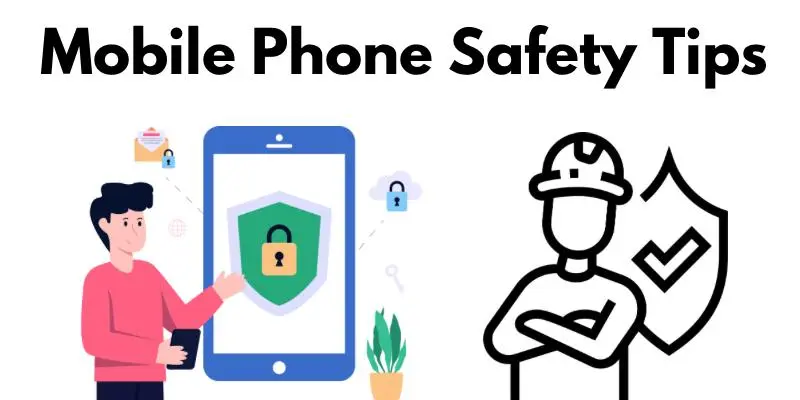Essential Mobile Safety Tips You Should Use Daily
Published: 17 Jun 2025
Your phone is with you all day—at home, at work, and everywhere in between. We use it for talking, texting, shopping, and even banking. But how often do we stop and think about keeping it safe? It’s easy to forget how much we depend on our phones. One mistake can put your data and privacy at risk. That’s why using Mobile Phone Safety Tips is so important. A few simple habits can help avoid big problems. You don’t need to be a tech expert to stay protected. Just follow the right steps and stay smart. Let’s start learning how to protect your phone today.

Smart Mobile Phone Safety Tips You Can’t Ignore
Your mobile phone is part of your daily life. Let’s explore smart and simple ways to keep it safe and secure.
Use Strong Passwords
Your phone needs a strong lock to keep data safe. Don’t use easy passwords like “1234” or your name. Instead, use a mix of letters, numbers, and symbols. Make it hard for others to guess.
Enable Screen Lock
Screen locks protect your phone from unwanted use. A PIN, pattern, or fingerprint adds a safety wall. You can set this in your phone’s settings. It takes seconds but helps a lot.
Avoid Public Wi-Fi
Free Wi-Fi sounds helpful, but it’s not always safe. Hackers can steal your data on public networks. Use your mobile data or a trusted VPN instead. Stay safe when you browse or shop online.
Update Your Phone
Software updates are more than just new looks. They fix bugs and stop hackers from getting in. Always update your phone and apps when a new version comes. It keeps your phone safe and fast.
Install Trusted Apps
Only get apps from Google Play or Apple’s App Store. Unknown apps can steal your info. Before installing, check ratings and reviews. Be smart—choose apps you can trust.
Use App Permissions Wisely
Many apps ask for things they don’t need. Why should a calculator use your camera? Go to settings and turn off extra permissions. Keep your privacy in your hands.
Turn Off Bluetooth
Bluetooth is useful but risky if left on. It can let strangers connect to your phone. Turn it off when you’re done using it. It saves battery, too!
Lock Your SIM
Your SIM card holds data and your phone number. If someone removes it, they can misuse it. Set a SIM lock with a PIN code. You’ll find this in your phone’s security settings.
Backup Your Data
Losing your phone shouldn’t mean losing everything. Back up your contacts, photos, and files. Use cloud services or save to your computer. It’s easy, and it gives you peace of mind.
Don’t Share Your Phone
Letting others use your phone sounds friendly, but it’s risky. They may access private apps or data. It’s better to say no or keep a guest mode ready. Your phone, your rules.
Use Phone Tracking
Phone tracking helps if you lose your device. Most phones have a built-in “Find My Phone” feature. Set it up now—you’ll thank yourself later. It helps you lock or erase your phone remotely.
Avoid Unknown Links
Links in texts or emails can be traps. Don’t click if it looks odd or unknown. It may lead to scams or downloading harmful files. Think before you tap.
Protect Personal Info
Be careful when apps ask for your info. Don’t share your full name, address, or passwords easily. Use fake names when not needed. Keep your identity safe online.
Use Two-Factor Login
Two-factor login adds a second step after your password. It can be a text code or an app alert. Even if someone gets your password, they can’t get in. Set it up for important accounts.
Keep Phone Clean
Your phone gets germs, dust, and dirt. Wipe it with a soft cloth regularly. Avoid wet cloths or harsh cleaners. A clean phone is a safe phone.
Avoid Overcharging
Leaving your phone on charge all night can hurt the battery. Unplug it when full. Use original chargers to avoid overheating. A healthy battery lasts longer.
Use Secure Lock Apps
Some apps protect photos, chats, and files. You can lock them with passwords or fingerprints. Use these for extra private stuff. It’s like having a second lock inside your phone.
Be Careful With Calls
Scam calls are common now. Don’t answer unknown numbers or give personal info. Block and report suspicious numbers. Always stay alert.
Don’t Root or Jailbreak
Changing your phone’s software can look cool, but it’s dangerous. It removes safety tools and makes your phone easy to hack. Stick to the official system for safety.
Watch App Behavior
Apps should work well without draining the battery or acting strangely. If one crashes a lot or uses too much data, delete it. Bad apps can hide danger.
Final Verdict
We’ve reached the end of our journey into Mobile Phone Safety Tips, but really, it’s just the start. We talked about passwords, app safety, backups, and smart habits. Now it’s your turn to take action. My top recommendation? Set up two-factor login on your main accounts today—it’s a game-changer.
Loved this? There’s more waiting for you. Tap into other helpful blog posts right now.
Be the smart user your phone needs—protect it, value it, and explore more knowledge with us.
FAQs
Have more questions about mobile phone safety? These common answers can help you stay protected.
It helps protect your personal data, privacy, and device from damage or misuse. A few smart steps can save you from big risks.
Yes, installing a trusted antivirus app adds extra protection. It can block unsafe apps and websites.
Use a phone finder app or Google’s Find My Device. Lock your phone remotely and erase data if needed.
No, only download apps from trusted sources like the Play Store or App Store. Other sources may carry viruses.
Yes, it’s possible. Always turn off Bluetooth when not in use and avoid pairing with unknown devices.

- Be Respectful
- Stay Relevant
- Stay Positive
- True Feedback
- Encourage Discussion
- Avoid Spamming
- No Fake News
- Don't Copy-Paste
- No Personal Attacks

- Be Respectful
- Stay Relevant
- Stay Positive
- True Feedback
- Encourage Discussion
- Avoid Spamming
- No Fake News
- Don't Copy-Paste
- No Personal Attacks





